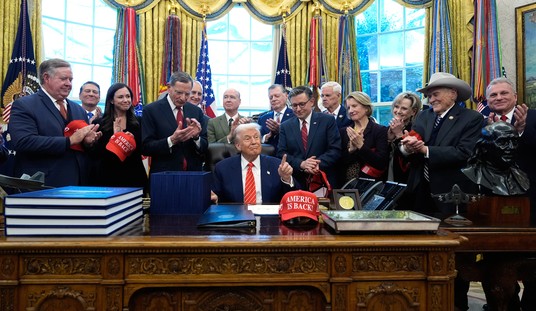![[mc_name name='Rep. Paul Ryan (R-WI)' chamber='house' mcid='R000570' ] plays tetris](https://redstate.com/uploads/2015/10/paul-ryan-plays-tetris.jpg)
The word has gone out tonight after [mc_name name=’Rep. Paul Ryan (R-WI)’ chamber=’house’ mcid=’R000570′ ] met with the House Freedom Caucus, as part of a tour of a number of the key House caucuses: Ryan will take the Speaker job after all, despite his many protests against wanting the job – but only if his enumerated conditions are met, including among other things agreement by the various caucuses to explicitly endorse him for Speaker and drop any future efforts to call for a new Speaker during sessions of Congress. Ryan’s position reflects a shrewd understanding of his negotiating leverage and the position of his potential critics on the Hill, as well as his genuine willingness to walk away from a job he has never wanted. It now puts the Freedom Caucus in particular in the uncomfortable position of being the bad cop who blows up the deal – but since the whole reason for the Freedom Caucus’ existence is supposed to be their willingness to play that kind of brinksmanship, Ryan’s calling of their bluff should be met with some serious reflection about the way forward.
Ryan laid out his terms this evening. “He told colleagues he would seek to change the rule allowing a simple majority of the House to remove a sitting speaker. The threat of such a vote helped hasten Boehner’s departure.” He asked for a more open legislative process but also for a promise up front that would secure more party unity by demanding that everyone buy in to his leadership: “in order to run, he wants the fractious Republican conference to rally around him, including the moderate Tuesday Group, the hard-line House Freedom Caucus and the conservative Republican Study Committee…’I’m willing to take arrows in the chest but not in the back.'” (Ryan has other demands such as acceptance of the fact that time with his family would trump some of the fundraising duties Boehner has pursued).
Considered both as a pure negotiating tactic and as a platform for constructing a successful Speakership, this is canny, even Machiavellian strategy. Ryan would enter the Speakership having co-opted and defanged every potential threat by demanding that every power center in the party take responsibility for endorsing him. Unlike Boehner, Ryan could credibly claim that he got the job in a wide-open process (there are still multiple other Members floating candidacies) and was the voluntary choice of every faction, not forced on anyone. That would significantly reduce the rhetorical force of the slings and arrows that could be thrown at him. He can credibly demand such a high price because everyone knows he isn’t bluffing – he really would rather stay Chairman of Ways and Means. And ironically, if installed on these terms, Ryan would be able to negotiate with the White House on a much stronger footing than Boehner ever did, having a more credible ability to deliver his own caucus. In the process, he has shown himself a savvier and harder-nosed negotiator than his critics have previously suspected.
For students of history, an instructive parallel to what Ryan is doing can be found in the Glorious Revolution that installed William of Orange, the Dutch head of state, as King of England in 1688 (Michael Barone’s book Our First Revolution has a great, readable account of the intrigue). William, unlike Ryan, was very much interested in being King of England, but like Ryan he was less interested in the job itself than what he could accomplish with it – specifically, to cement an Anglo-Dutch alliance of Protestant states against his mortal enemy, Louis XIV of France. The English monarchy at the time was in some ways like this Speakership – the English had beheaded one King (Charles I) within living memory and were ready to rebel against their present monarch, James II, in part due to wholly warranted suspicions that he was excessively indebted to Louis XIV and thus not acting in England’s best interests, and moreover using funding from the French King to evade the regular appropriations process that would require calling Parliament more often to fund the King. But for William to invade England and seize the crown from James would be a seriously hazardous undertaking, both for him and for those allies in England who supported what James would doubtless regard as treason. What this set in motion was a multi-directional bidding war: William had to make promises to the Dutch States General of the value of the expedition in order to obtain support to launch an invasion, while James made various frantic promises to Parliament to try to mollify it. But once William entered England and James fled before his advance, suddenly Parliament found itself in an abruptly weakened position – William could turn around and go home to Holland, but if he did so, the country could fall into anarchy.
So William met with one power center after another, neutralizing their opposition, and set conditions. A compromise was offered by the House of Lords, which balked at openly deposing a king, of a regency while James lived; William spread word that he would not accept it, and would leave unless made King in his own right. The Lords voted the plan down. He likewise rejected a plan to have him rule only during the life of his wife, who was the one actually related to the British royal family (being James’ daughter). Again, Parliament folded – but not before extracting some promises of its own to its own ends, including not only succession through Mary’s sister Anne (who would later become Queen), but more significantly, a list of procedural reforms embodied in a Declaration of Rights that would in practice prevent the King from abusing some of the powers that James had used to provoke the crisis in the first place. The resulting settlement set the British monarchy on stable footing (it has had no similar crisis since 1689), but also laid the groundwork for the gradual erosion of its power into the waiting hands of Parliament.
Ryan is playing a similar dynamic to his fullest advantage. The moderates are unlikely to turn him down, which puts the Freedom Caucus in the unenviable position of having to be the ones to take or leave this deal, with the prospect that the next choice for Speaker might be significantly worse or even might protract the process so long that Boehner just stays in the job for months on end. Anarchy or a restoration of the hated oppressor puts them under great pressure to take the deal.
They might still leave it. An empowered and emboldened Ryan, even with the best of intentions and the sturdiest of commitments from the Freedom Caucus, still won’t be able to negotiate good deals with this White House as long as [mc_name name=’Sen. Mitch McConnell (R-KY)’ chamber=’senate’ mcid=’M000355′ ] can undersell him. And as Erick notes, buying in to Ryan’s deal on Ryan’s terms will neuter the Freedom Caucus’ remaining leverage. But they might also play the hand that Parliament played in early 1689, and agree to Ryan’s conditions but on some of their own, possibly including assurances on specific agenda items like immigration (which he is signalling a willingness to take off the table) and the Export-Import Bank, or possibly including more concrete procedural changes.
The Freedom Caucus can run from its decision no more. If it accepts Ryan, it will be absorbed into the body of the House, and must trust that it can influence him from the inside to bring home results. If it demands conditions, it must be prepared to match Ryan’s willingness to walk away. And if it vetoes him, it will face the responsibility of coming up with a Plan B that has some prospect of better results. If you come at the king, you had best not miss.













Join the conversation as a VIP Member